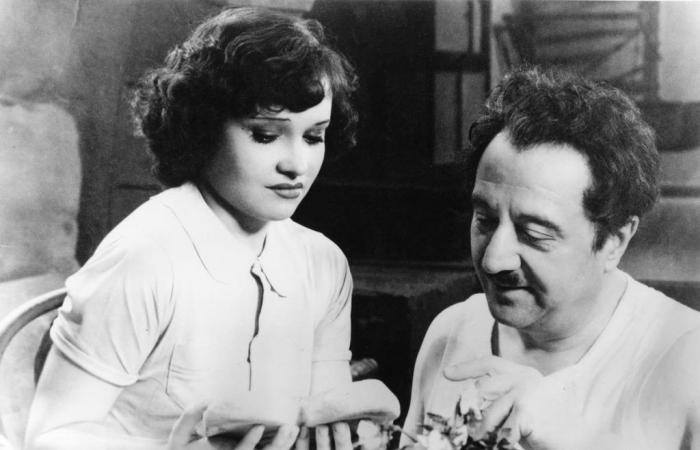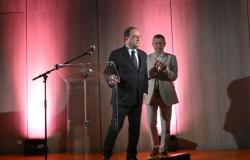In a few words, how would you present the work of Marcel Pagnol to a young generation who does not know this great filmmaker from the 1930s to the 1950s?
Marcel is one of the greatest creators of the 20th century, whether in theater, cinema or literature. He created a mythology of Provence and auteur cinema. “Marius” is the first arthouse film. In the 1930s, he was the best-known French filmmaker in the world thanks to his Marseille trilogy, “The Baker’s Wife” or “Le Schpountz”. He discovered Raimu and Fernandel, was the filmmaker of happiness, of life… The cinematographic movement that he created would inspire the New Wave and Italian neorealism.
In what environment did young Marcel grow up?
His grandfather was a master stonemason. His father was a schoolteacher, his mother a seamstress, so his background belonged to the middle class, but with great intellectual prestige because at the beginning of the 20th century, the schoolteacher was part of the authorities of a village, alongside the mayor and the priest. His father and mother managed to arouse his curiosity for the world through various stratagems, whether through DIY or conversations opposing his father, a secularist, and his uncle Jules, a Catholic and royalist. He was thus always immersed in a world of debates of ideas, with a great sensitivity for many areas whether it be nature, science, the study of great texts, such as those of Homer, Ovid, Shakespeare and of course, this play which would make him want to be a man of the theater, “Cyrano de Bergerac”. Marcel wanted to become Edmond Rostand!
In the program
Film lovers have a date until July 7 for this 52nd edition of the La Rochelle Cinema Festival, the most attended in France after Cannes with 90,000 admissions recorded in 2023, 200 films and 300 screenings presented this year. And tributes expected to Marcel Pagnol, Chantal Akerman, Natalie Wood, Michael Haneke and Françoise Fabian…
Marcel Pagnol Foundation
“Marcel Pagnol is one of the greatest creators of the 20th century, whether in theater, cinema or literature,” believes his grandson Nicolas Pagnol.
Famous writer and playwright, how did he move from theater to cinema?
At the end of 1929, he saw “Broadway Melody” in London and understood that the theatre would decline in the face of talking pictures, because the latter allowed for ellipses, for entering into the confidence of the actors. He also saw the commercial potential, in the sense of the distribution of a work. Bob Kane, who was the producer of Paramount France, agreed to produce “Marius” and opened the doors of the Joinville studios to him. There, Marcel would learn all the trades, from operating the camera to sound recording, including development. Bob Kane would call Alexander Korda to direct “Marius”. He would have the intelligence to tell Marcel that he would take care of directing the film, and he would direct the talking actors. The two of them would learn together to make talking pictures. That’s how it all began.
With “Jofroi”, the first film shot entirely in a natural setting, Pagnol lays the foundations of a sound and naturalist cinema.
He was the first to bring cameras out of the studios, to plant them in Provence, to shoot in natural settings, with live sound and would invent the sound truck. “Jofroi” is also a film shot, as is often the case, with non-professional actors. The main role will go to his friend Vincent Scotto, great composer of “J’ai deux amours”… Marcel there laid the foundations of his cinema, which will achieve considerable success due to its quasi-naturalism. People had never seen that.
In Pagnol’s films there are these picturesque dialogues, this human warmth which brings comedy to often dramatic stories. Why was he so keen to superimpose lightness and tragedy?
Marcel is a formidable decoder of human relationships, of the springs of the soul… He presents us with an idealized world, where men and women go through very hard things, but never let themselves get down and continue to live with this Provençal character: we talk a lot while saying little. We joke, in a very imaginative way, revealing very little of ourselves. It is the events that tell the drama.
Marcel Pagnol Foundation
Nicolas Pagnol has devoted himself to managing his grandfather’s work for over fifteen years.
He knew the little faults and failings of men, without ever despairing of humanity.
What was his personality?
Marcel was someone very calm, very funny, but not a grimacer. He was not a joker. A great writer said of him: “Pagnol, he has a cheerful eye that looks towards the future and a sad eye that looks towards the past.” If you look at a photo of Pagnol, that’s exactly it. There was a lot of nostalgia in him, he was not fooled by the world, he knew the little faults and failings of men, without ever despairing of humanity.
Your grandfather was able to create a family of actors, Raimu, Fernandel, Orane Demazis… How did he meet Raimu and what relationships did they maintain?
Marcel met Raimu in 1929, at the Marigny theater. He had already enjoyed immense worldwide success with “Topaze”. Raimu agreed to see the script and called him back two or three days later to accept “Marius”. A great friendship began, made up of rants, little low blows, big reconciliations. When Raimu died in 1946, Marcel wrote his famous farewell to him: “We cannot give a speech at the grave of a father, a son or a brother, for me you were all three at the same time” . That’s wonderful.
Which film should you start with to discover the work of Marcel Pagnol? And which is your favorite?






